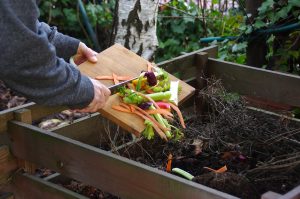
Federal agencies are investing millions of dollars to support innovative compost plans and programs that divert food waste from landfills.
The University of Florida Institute of Food and Agricultural Sciences is leading the charge to help cities and counties build robust compost programs that are green, sustainable and economically beneficial.
On March 27, the UF/IFAS Gulf Coast Research and Education Center will host the first UF/IFAS Research Compost Consortium Conference from 9:30 a.m. to 3 p.m. This free event invites Florida’s city, county and state decision makers, agriculture and ornamental horticulture producers and compost industry services to come together. Lunch is provided and registration is required to this free program.
Here are some of the objectives of the event:
- Collaborate with the Florida Composting Council to explore economic, policy and environmental needs for compost standards,
- Develop best practice for communities,
- Connect attendees with compost resources and federal agencies that are providing funding opportunities to help build programs,
- Encourage entrepreneurs to join the movement and help build thriving compost resources in their local municipality,
- Explore ways municipalities can develop incentives to improve capacities for industry partners.
“We are calling all leaders and those interested in establishing common ground on to how to use, manufacture and implement policies on composting by making compost commonplace and with sustainable policies that will benefit the environment, communities and our landscape industry,” said Mica McMillan, assistant professor at the UF/IFAS Fort Lauderdale Research and Education Center.
Compost has many uses that go beyond serving as homeowner potting mix and topsoil for gardens, said McMillan.
“As a locally produced resource, compost can be implemented into production and landscape industry practices. Some examples include use of compost by plant, vegetable and tree growers as well as for landscape design, said McMillan.
Meanwhile, there are other industries, such as those involved in biomass and manufacturing, that are exploring ways to environmentally maximize the use of compost, such as turning food waste into energy to power homes and businesses.
“Compost is a resource that we are throwing into landfills, and we are running out of space,” said Liz Felter, a UF/IFAS regional specialized agent (RSA) and commercial production horticulture agent based in Central Florida at the UF/IFAS Mid-Florida Research and Education Center. “Researchers, working together with industry and municipal partners, can create results that will reduce our environmental impact as well as open the door to economic development with composting businesses throughout the state of Florida.”
Last October, UF/IFAS announced the establishment of a statewide Compost Consortium. The mission is to seek alternatives to encourage Florida residents and businesses to steer food waste, grass clippings and more away from landfills by composting these items. McMillan and Felter are bringing resources, agencies and groups together to make composting a universal approach in the Sunshine State.
###
By Lourdes Mederos, rodriguezl@ufl.edu
ABOUT UF/IFAS
The mission of the University of Florida Institute of Food and Agricultural Sciences (UF/IFAS) is to develop knowledge relevant to agricultural, human and natural resources and to make that knowledge available to sustain and enhance the quality of human life. With more than a dozen research facilities, 67 county Extension offices, and award-winning students and faculty in the UF College of Agricultural and Life Sciences, UF/IFAS brings science-based solutions to the state’s agricultural and natural resources industries, and all Florida residents.
WHY FOOD IS OUR MIDDLE NAME
Feeding a hungry world takes effort. Nearly everything we do comes back to food: from growing it and getting it to consumers, to conserving natural resources and supporting agricultural efforts. Explore all the reasons why at ifas.ufl.edu/food or follow #FoodIsOurMiddleName.
 2
2
